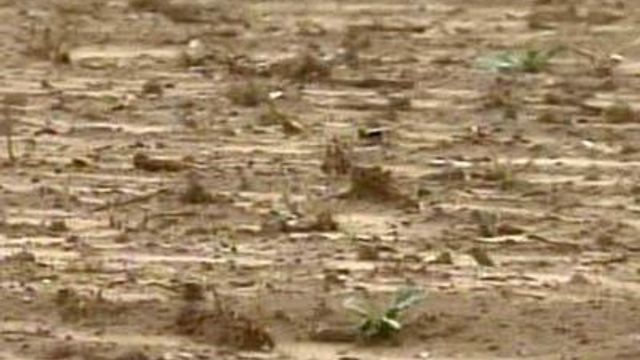Easley Asks Federal Aid for Drought-Stricken Farmers
Gov. Mike Easley went to Capitol Hill Thursday to push for federal grants to North Carolina farmers who have lost much of their crops to the statewide drought.
Posted — UpdatedIn testimony to the House Agriculture Committee, Easley said this summer's baking heat and the dearth of rain combined to devastate crop yields and put farmers in danger of losing their livelihoods. The state has experienced about $325 million in crop losses, and the number is growing, he said.
"As North Carolina is drying up, our state's No. 1 industry is also suffering," he said. "The bottom line is that our farmers need more money. They do not need more loans that they will be unable to repay when their crops fail to bring in enough income. They need grants so they will be able to continue to farm next year and many years into the future."
Easley cited statistics to demonstrate the drought's impact on North Carolina farmers:
- Soybean yields are projected at 20 bushels per acre, which is the poorest yield since 1983.
- Peanuts are down 800 pounds per acre from last year.
- Hay production is off by about 45 percent.
- The cotton crop is experiencing a lower-quality crop in addition to lower yields.
- The corn crop was expected to be the largest in decades, but yields are almost 90 bushels per acre lower than last year.
"Boosted by good prices and nationwide interest in ethanol production, our farmers planted 1.1 million acres of corn. But lack of rain has stunted growth, and extreme temperatures have wilted the plants," he said.
The empty fields on James Sharp's Wilson County farm back up Easley's assessment. The fields would normally be filled with cabbage in October, but Sharp said he cut back his planting this fall because of the drought.
"We just cut back the acres, limited it to just the acres we could irrigate," he said, adding that he plans to expand his irrigation system next spring in case the drought continues. "All the crops have suffered from the drought and the extreme heat, and it will make a difference on our bottom line."
Easley noted that the drought is the worst North Carolina has seen since records started being kept in 1895. About 250 water systems statewide have adopted voluntary or mandatory water restrictions to conserve as much as possible, he said, but forecasts call for a drier-than-normal winter, putting more pressure on the state's agriculture industry.
"If we don't replenish our lakes and ponds and streams during the winter, then we're really going to face some tremendous challenges in the spring," the governor said.
State officials are putting plans in place to handle the growing crisis, he said, including more pipe connections between counties and cities to transfer water, using treated wastewater for irrigation and possibly using the National Guard and private contractors to haul water to the neediest areas. Officials also are looking at offering tax credits to businesses that conserve and recycle water, he said.
"Unless we can figure out a way to make it rain – and I am not joking here – the conservation measures, both voluntary and even ordered by local governments, probably will not be enough to revive the entire industry," he said. "We're going to have to have some assistance this year. The farmers just aren't going to be able to continue."
Because the U.S. Department of Agriculture has declared 85 counties in North Carolina disaster areas, farmers in those counties and 11 neighboring counties are eligible for low-interest, emergency loans.
Second District Congressman Bob Etheridge, a member of the House Agriculture Committee, agreed with Easley that loans aren't enough. He also wants farmers to get grants that they do not have to pay back.
"This committee, we're not looking at loans; we're looking at assistance," the Harnett County Democrat said. "If we can help people around the world, we sure can help our farmers who help pay the taxes in this country."
Sharp said government grants are crucial to the survival of many eastern North Carolina farmers like himself.
"In agriculture, we're already working with very slim margins to start with, and when Mother Nature's completely against us in a season, we certainly need all the help we can get to move forward for next year," he said.
Etheridge called the drought a national disaster that calls for a federal response. Drought relief hasn't been included in a supplemental appropriation bill now winding through Congress, and he said Thursday's testimony could help encourage more members of Congress to support adding it to the bill.
"We'll have to do whatever is necessary to keep farmers in business in this country, or else we will become a second-rate country pretty quickly," he said. "When (Hurricane) Katrina hit, we responded. When 9/11 hit, we responded. That's what we as Americans do, and that's what Congress should do."
Eighth District Congressman Robin Hayes said the wildfires that have raged in California this week could provide a platform for approving emergency money for drought relief.
"The two put together ... should be heard loud and clear," the Cabarrus County Republican said.
The committee also heard testimony from USDA meteorologists, who said drought conditions across the Southeast will last until at least the end of January.
"I hope you are wrong," Etheridge said, noting that maps provided little encouragement on the future of the drought.
• Credits
Copyright 2024 by Capitol Broadcasting Company. All rights reserved. This material may not be published, broadcast, rewritten or redistributed.






